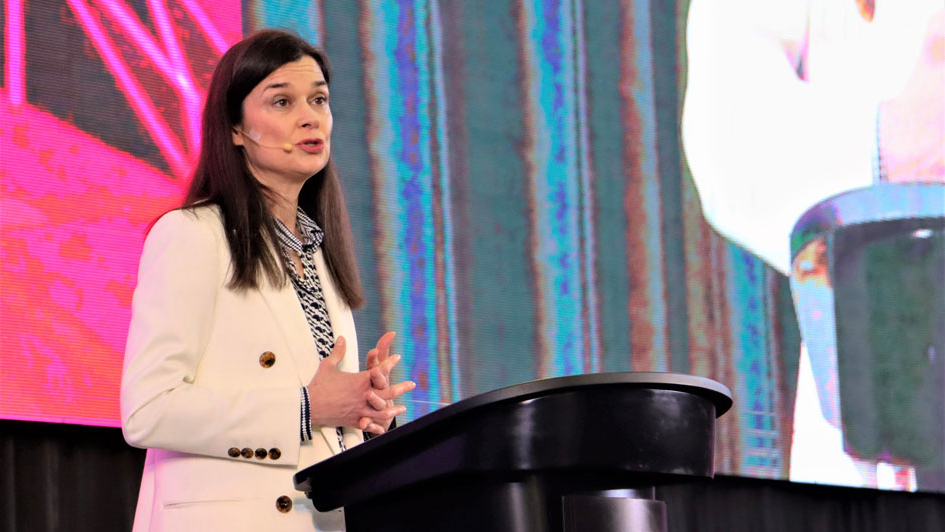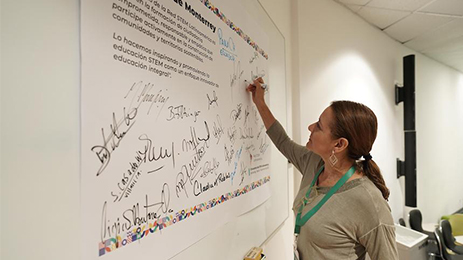News | Education | 23 January 2023
Red STEM Latinoamérica commits to nurturing empathetic citizens to create sustainable and connected societies
63 institutions from 12 countries joined the II Encuentro Red STEM Latinoamérica in-person to discuss intensifying the STEM learning approach.
The IX International Congress of Educational Innovation is recognized as the most prominent education event in the Spanish-speaking world.
Siemens Stiftung team (Paola Pino, Dr. Barbara Filtzinger, Ulrike Wahl, Dr. Nina Smidt) with Prof. Dr. Kristina Reiss and other members of the network.
Panel on specialized teacher and lecturer networks at the Encuentro Red STEM Latinoamérica. Anna Vater from the Siemens Stiftung presented the OER portal CREA.
The second meeting of the Red STEM Latinoamérica concluded after an intensive 4-day agenda (January 16-19, 2023). It was an integral part of the IX International Congress of Educational Innovation which took place in Monterrey, Mexico. Established in 2006 by the Institute for the Future of Education of TEC de Monterrey, the congress is recognized as the most prominent education event in the Spanish-speaking world. This year it witnessed in-person attendance of over 4,900 people from 36 countries and 561 institutions with an online reach of 12 million. Hosting keynotes, panels, special events and networking spaces – the congress provided a platform for leading specialists, representatives of government, academia, international organizations, private sector, and foundations to meet, kindle new and strengthen existing alliances to steer the future of education. As the coordinator of the Latin American STEM education network, Siemens Stiftung was invited to join forces to drive innovation in education with a focus on STEM.
Quality education needs innovation

Managing Director and Spokesperson of the board, Dr. Nina Smidt delivered a keynote on innovation in education on the inaugural day. Addressing more than 4,000 on-site and 6,000 virtual attendees, she showcased the foundation’s contribution to furthering quality STEM education through the Red STEM Latinoamérica – a purpose-oriented network. Coordinated by Siemens Stiftung, it implements joint efforts to foster the STEM approach for building committed citizenship by fostering sustainable communities and territories.
“By bolstering cross-border partnerships, we have enhanced the education fraternity and partnered regional initiatives on STEM education to pave the way for sustainable education in Latin America. This learning approach addresses global issues directly related to the 2030 Sustainable Development Goals. As the Industrial Revolution 4.0 gains momentum and influences every aspect of our everyday lives – innovation in education is an absolute need as it helps young people to shape a creative and critical thinking mindset, intrinsic problem-solving abilities, critical thinking skills and a sense of curiosity”, she said.
Dr. Kristina Reiss, Professor Technische Universität München and Dr. Barbara Filtzinger, Head of education at Siemens Stiftung presented a paper on STEM+ at the congress. STEM+ is more than S-cience, T-echnology, E-ngineering, and M-athematics. STEM+ removes subject boundaries and focuses on society to resolve its pressing challenges.
Partnerships for educational transformation
Under the motto “Strengthening Partnerships for Educational Transformation”, 63 institutions from 12 countries joined the meeting to discuss diverse issues including intensifying the STEM learning approach locally, deepening intersectoral alliances, public policy and educational transformation on STEM programs.
Apart from the network members, Mexican authorities including Sofia Leticia Morales Garza, Secretary of Education at the Federal State of Nuevo León, high-level representatives of the Federal States of Tlaxcala, Zacatecas, Tamaulipas jointly committed to the “Declaration of Monterrey of the Red STEM Latinoamérica”. Rafaela Diegoli, Academic Vice-Chancellor of the Tecnológico de Monterrey, Michael Fung, Director of the Institute for the Future of Education of Tecnológico de Monterrey, Claudia Robles, Executive Director of Innovec, reinforced their institutional voices as partners of the Latin American STEM network. They all emphasized the relevance of STEM education in nurturing our future generation to shape and contribute to transforming education and society.

Both UNESCO and UNICEF participated as strategic partners, reinforcing their determination to collaborate with the different parts within the Red STEM Latinoamérica ecosystem: the 44 current and further upcoming STEM Territory initiatives, 8 regional STEM-working tables and supporting the specialized networks, such as Redecanedu the network of 34 deans of education from 13 countries, and the regional network of teachers and learning communities from 6 countries.
“As the STEM education network in Latin America, our aim is to influence the formation of committed, responsible and empathetic citizens who actively participate in the creation of sustainable communities and territories. We do this by inspiring and promoting STEM education as an innovative approach to integral formation”: An excerpt from the declaration.
Siemens Stiftung’s regional office team for Latin America, led by Ulrike Wahl jointly organized the II encounter and the team’s participation at the international congress. Badin Borde gave insights into the topic of climate change education and Anna Vater presented the world of Open Educational Resources and the OER platform CREA.


